Author: info@discoverdairy.com
Meet Daniel and Jeffrey: Instructors in PA Prisons Who Are Planting Seeds and Offering a Little Bit of Peace
This story is part of a series of “meet & greets” with individuals who use our Adopt a Cow program to inspire you with the endless ways you can incorporate the program in the classroom and beyond!
While Discover Dairy’s Adopt a Cow Program is usually utilized in an elementary classroom setting, two instructors from Pennsylvania prisons have discovered meaningful ways to introduce the program and make agriculture connections with their inmates.
Daniel Nicklen, an ABE Teacher in the Department of Corrections in Albion, PA, has inmates of all ages – mainly 22 and up – who take general education classes with him.
“I teach in a classroom inside the prison. Each prison in Pennsylvania is set up like a small town, and that includes an education building with general education classes, vocational classes, a library, guidance counselor and principal,” Daniel shared. “I’m able to teach any of the core subject areas such as ELA, Math, Science, Social Studies, Health and Financial Literacy. In this prison, we have a large mental health population so I work a lot with those inmates given my background with special education.”
For Jeffrey O’Hara, a Horticulture Vocational Trade Instructor at the United States Penitentiary Canaan, he works with adult male, primarily white-collar offenders. Most are older than 25 and come from all walks of life. After hearing about the Adopt a Cow program, he thought it would help bring a sense of meaning and excitement to his horticulture class – while raising awareness about entry-level job opportunities in agriculture once inmates are released.
“They can sign up for my horticulture class. It’s a 200-hour class and it’s just basically an introductory program to horticulture. The Adopt a Cow program has very diverse subject content,” Jeffrey explained. “We tie in a little bit of the program with the growing of plants. We talk about how farmers grow corn to feed cows, different types of grain, and of course pasture grass and stuff like that.”
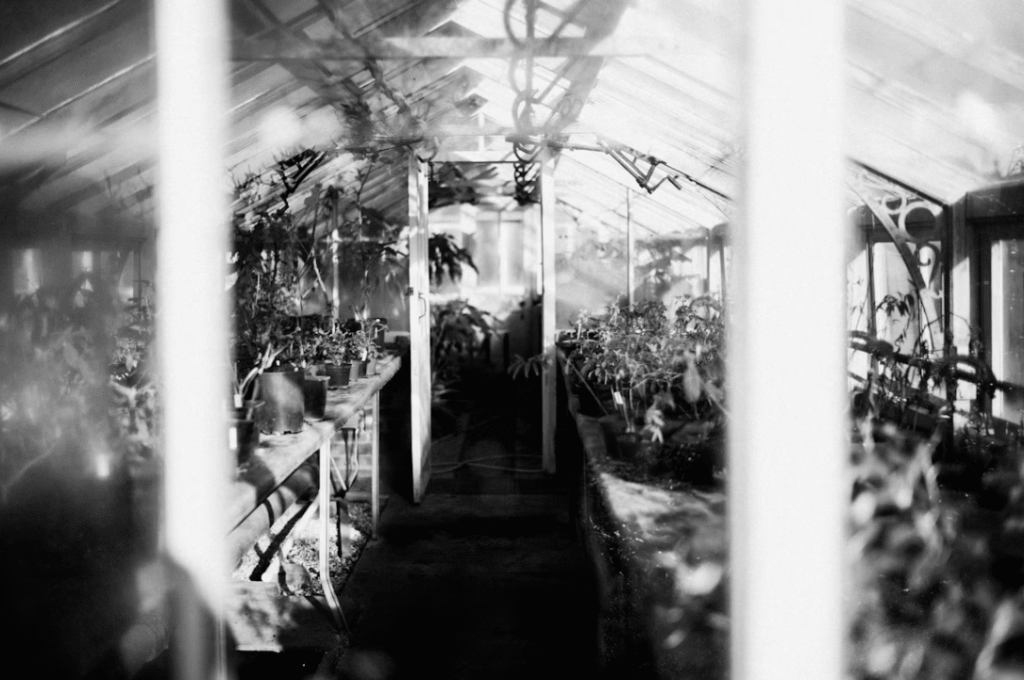
Introducing them to a new industry
With many of the prison’s inmates coming from inner cities, learning about cows is new to them.
“Some of my students lived in cities. They may never have seen or touched a cow or knew that’s where milk comes from. They don’t know any of the technical aspects that go into farming like the housing, bedding, and how fast the animals grow,” Jeffrey said.
With each classroom being paired with a calf from a Pennsylvania dairy farm, Daniel and Jeffrey receive regular photo updates, dairy facts, activity sheets, and other resources that help explain the calf’s growth, how the farmers care for her, and more.
“I have a bulletin board that I have dedicated to the program in the classroom. I mainly incorporated the program into my biology class, but students from other classes have been interested,” Daniel shared. “Usually when we get the monthly updates, I’ll share all the photos with the students on my projector which will usually lead to questions that we discover together as a group if I’m unable to answer it myself. I’m thankful there is a program out there to teach about agriculture in PA.”
For Jeffrey, the program is helping him introduce new concepts to his students about the science and technology that goes into farming.
“The biggest thing I use from the program is the dairy fun facts. I usually do that with every class and they’re very surprised that a cow can drink a bathtub full of water a day, for example, or how much the calf has grown. I believe the inmates do get information out of it,” Jeffrey added. “I also have the growth sheet provided by the program in case they want to compare how tall the cow is compared to how tall they are. I tell them how farmers need to have mechanical knowledge and computer knowledge, too. It’s just not planting seeds in the dirt anymore.”
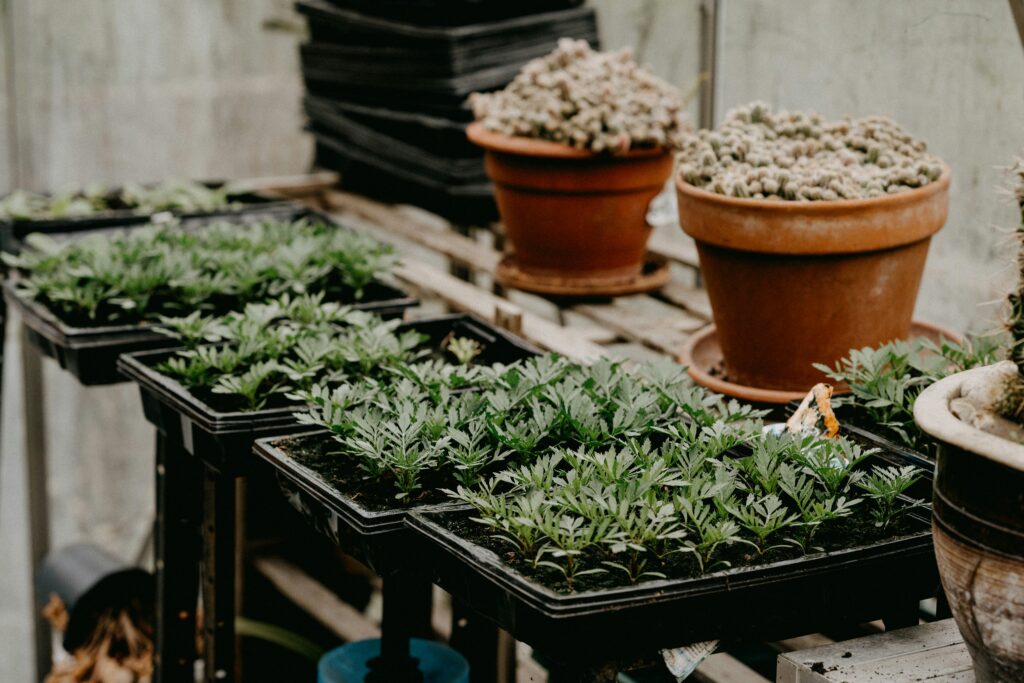
Helping them connect with their families
Both Daniel and Jeffrey say the Adopt a Cow program has also allowed inmates to connect with their families and children outside the facilities.
“I know that many of the students have family/children outside the facility that they share what they’re learning. They’ve shared the website so they can also view the program,” Daniel said.
“Adopt a Cow is giving them a background that they can maybe tell their kids or grandkids about – share some fun facts about a cow or share what we talked about in class,” Jeffrey added.
Offering a little bit of peace
Beyond fun facts and knowledge about agriculture, the Adopt a Cow program has helped give the students something to look forward to and a bit of “mental first aid” – two monumental things for inmates.
“The Adopt a Cow program has engaged them to ask questions and have something to look forward to [in my class]. Many of the students are forced to come to school due to the lack of a GED/high school diploma if they didn’t enter into the system with one,” Daniel said.
“This class gives them a little bit of peace away from life in the prison. There’s a lot of politics since they live in a dorm setting. It’s like a little city in itself, so when they come over to the greenhouse for class, it gets them away from the politics. It’s kind of like mental first aid and plant therapy,” Jeffrey shared.
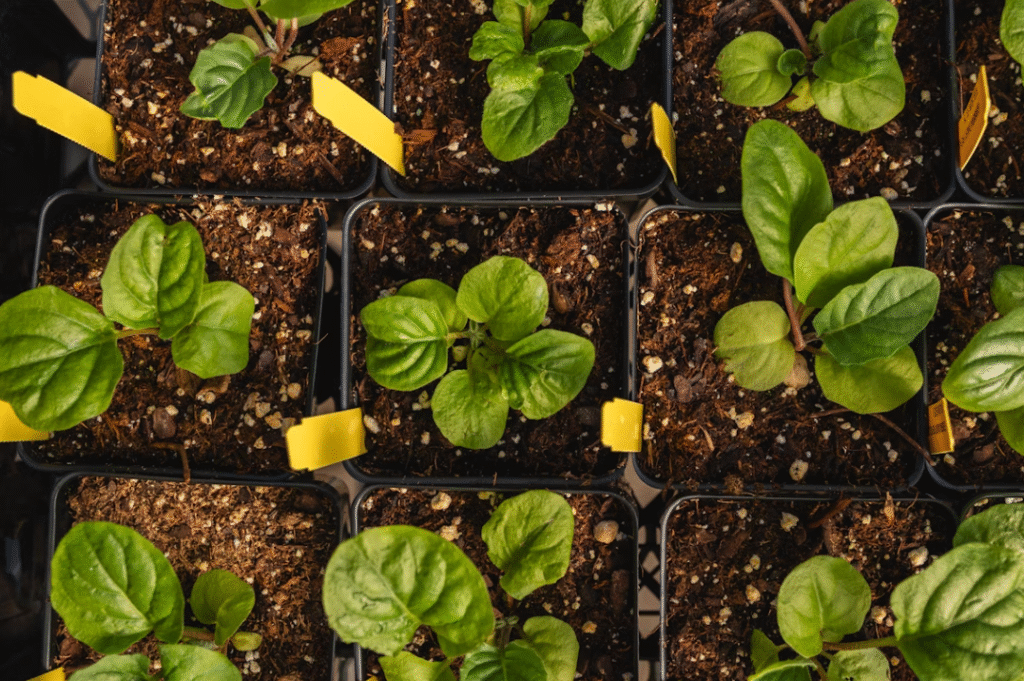
Opening their eyes to job opportunities
With many dairy farms experiencing labor challenges, the Adopt a Cow Program is helping the inmates learn about potential, entry-level job opportunities once they are released.
“The program has raised awareness of job opportunities after release, since these guys don’t have a lot of options. I’m not sure how many students are aware of jobs in agriculture, so this has been a great introduction for that. I would like to expand on this topic for next year and see if there is any way to have more agricultural industries involved in our re-entry fair,” Daniel shared.
“The connection for job skills when they get out is definitely important. When they are released from prison, they need to have a job skill so they can get employed and don’t fall back into a life of crime again,” Jeffrey said. “They only know the lifestyle they had before they came in. Hopefully taking this horticulture program changes their life and gives them a skill to help them find a life-sustaining wage.”
What is the most rewarding part about working in a prison setting and helping to make these connections with inmates?
“In our case, when an inmate plants let’s say a marigold seed, it’s small and they put it in the dirt. Then, 10 days later, it comes up and the inmates realize, ‘Wow, I did that.’ Then, he takes that and they’re transplanted into a cell pack. Then, he takes that cell pack and transplants it into the landscape bed. It gives them a sense of meaning,” Jeffrey shared. “That, of course, brings joy to me that I was able to make that connection and show them how to do this from start to finish.”
Discover Dairy is an educational series managed by the Center for Dairy Excellence Foundation of Pennsylvania in partnership with American Dairy Association Northeast, American Dairy Association Indiana, Midwest Dairy, The Dairy Alliance, Dairy Farmers of Wisconsin, Dairy Management West, Dairy West, New England Dairy, Dairy Farmers of Washington, American Dairy Association Mideast, Dairy Council of Florida, United Dairy Industry of Michigan, Maine Dairy and Nutrition Council, and Oregon Dairy Council.
Meet Monica: New York Teacher Who Guides Student-Led Dairy Drive to Address Food Insecurity
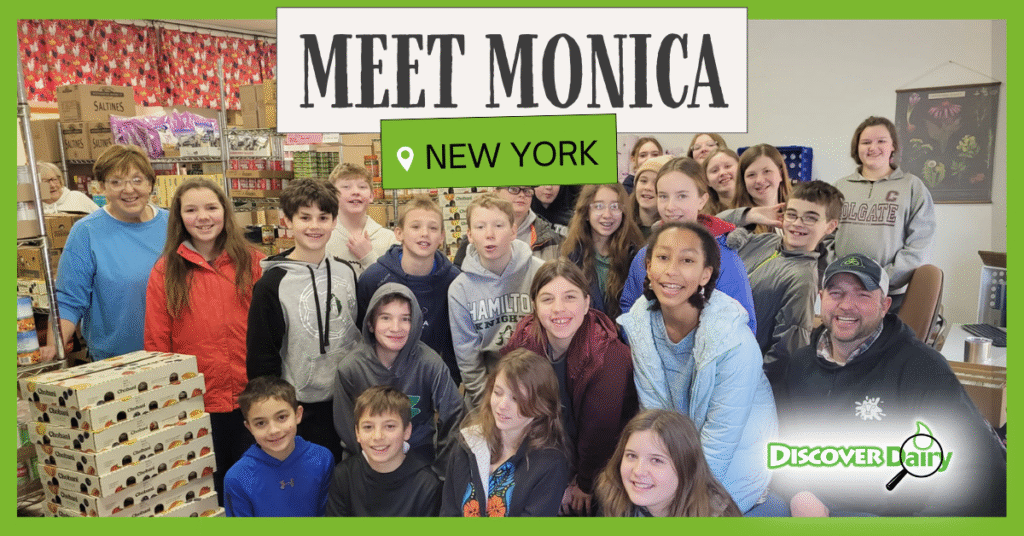
This story is part of a series of “meet & greets” with individuals who use our Adopt a Cow program to inspire you with the endless ways you can incorporate the program in the classroom and beyond!
Monica Chamberlain, a sixth-grade teacher from New York, is not only passionate about agriculture, but she works to give her students opportunities to solve real-world problems such as food insecurity. With her passion for project-based learning, Monica encourages her students to talk about real problems affecting their community and develop their own solutions. This is what kickstarted the student-led Dairy Drive in her classroom, where students sell paper cows to raise money to get milk into their local food cupboard for an entire year.
“We started talking about food insecurities and what it means to be food insecure. Students wondered if we have that here in our community. We did some research, and the kids quickly found out that a lot of our community relies on our food cupboard. From there, we dug into what does that mean and where is our food cupboard located?” Monica shared.
Students led the process, reaching out to the director of the food cupboard and asking their own questions. A key question they asked was: what items are frequently donated, and what items do the people who use the food cupboard truly need? They learned milk was the most requested item, but it was the least donated because it’s not shelf stable.
“From there, our driving question became how do we get milk into the food cupboard? The kids started brainstorming. I started reaching out to different organizations like American Dairy Association Northeast. They gave us paper cows, and the kids sell them for a dollar. Every single bit of our proceeds goes to purchasing milk,” Monica added.
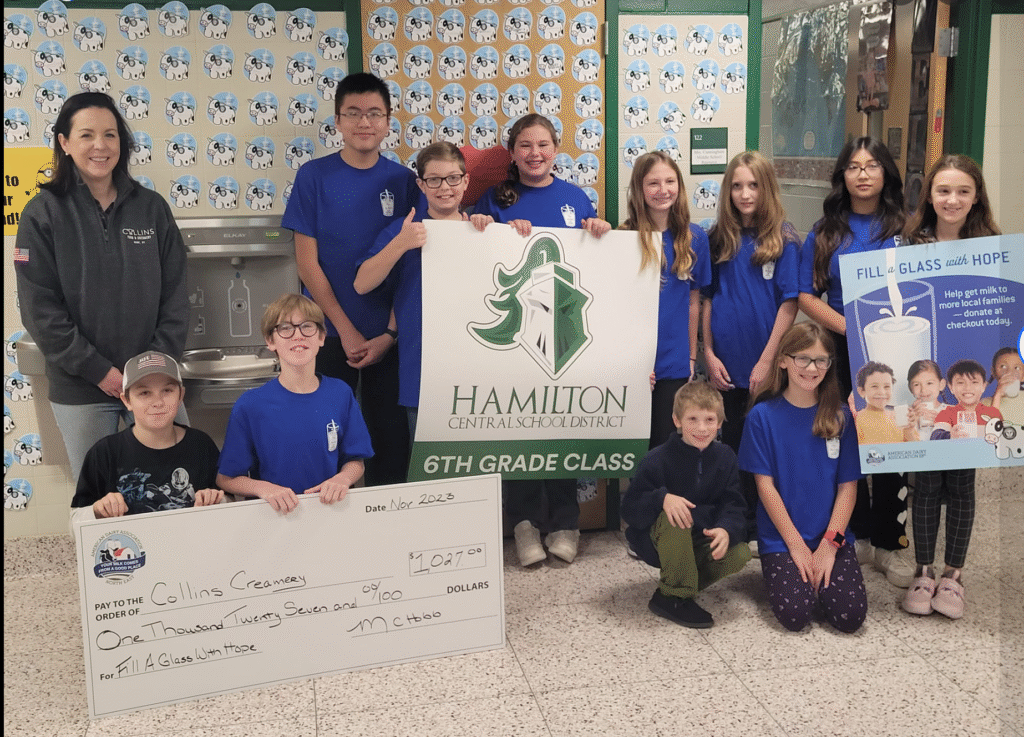
Her students took it a step further and figured out a way to ensure it was local milk they were purchasing and sending to the food cupboard.
“Students really wanted their money that they were working hard to collect to stay local and support a local farm. They decided to purchase our milk from Collins Creamery, right here in Rome, New York. The farm bottles their own milk and sells everything right on their farm,” Monica shared. “The kids worked with the farm, came up with a delivery schedule, and worked with the food cupboard on how many they should deliver at a time.”
During the first year of the Dairy Drive, her students raised about $400. The second year, the group raised even more and were able to support additional people in their community.
“The kids set a goal to get milk in the food cupboard for an entire year. We were two weeks shy, which is really disappointing, but we raised a ton of money. They were able to get milk not only in our food cupboard for almost the entire year, but they raised so much money that we actually started donating milk to a local assisted living facility for senior members,” Monica said.
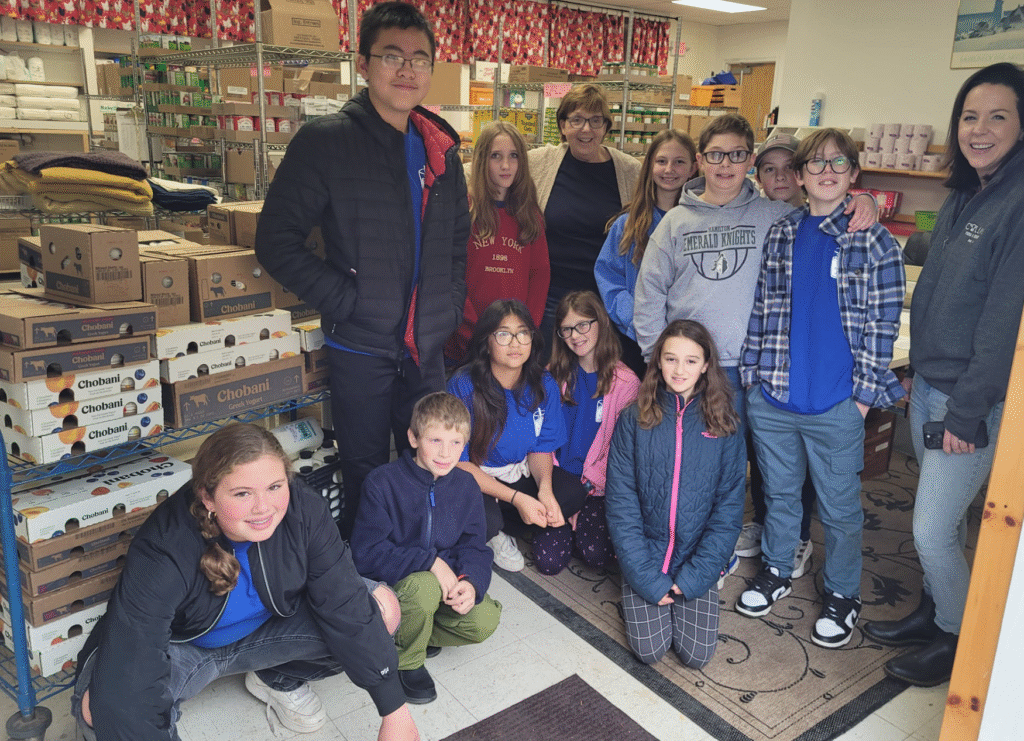
Beyond supporting their community, Monica’s students have been learning real-world business skills such as:
- Making phone calls and email communication. “Any phone calls that needed to be made, the kids were making them. Any emails that needed to be sent out, the students were sending them.”
- Coordinating with businesses and arranging delivery timelines. “We partnered with Chobani on this Dairy Drive as well, and Chobani donated flats of yogurt and cases of drinkable yogurt. The kids were arranging that, working on timelines, and meeting deadlines.”
- Learning how to address envelopes and write thank-you letters. “We write thank-you cards to anybody who helps, so kids are working on writing skills and how to address envelopes.”
“This has become more than just a fundraiser. Students are learning how to talk to people, how to approach people, how to manage money with the help of the teacher, and how to be turned down – because sometimes the answer is ‘no,’” Monica shared. “I’m constantly trying to find ways to teach our curriculum, but put a real-world twist on it. This gets students out in the community doing fun things, but they’re learning countless life skills,” Monica added.
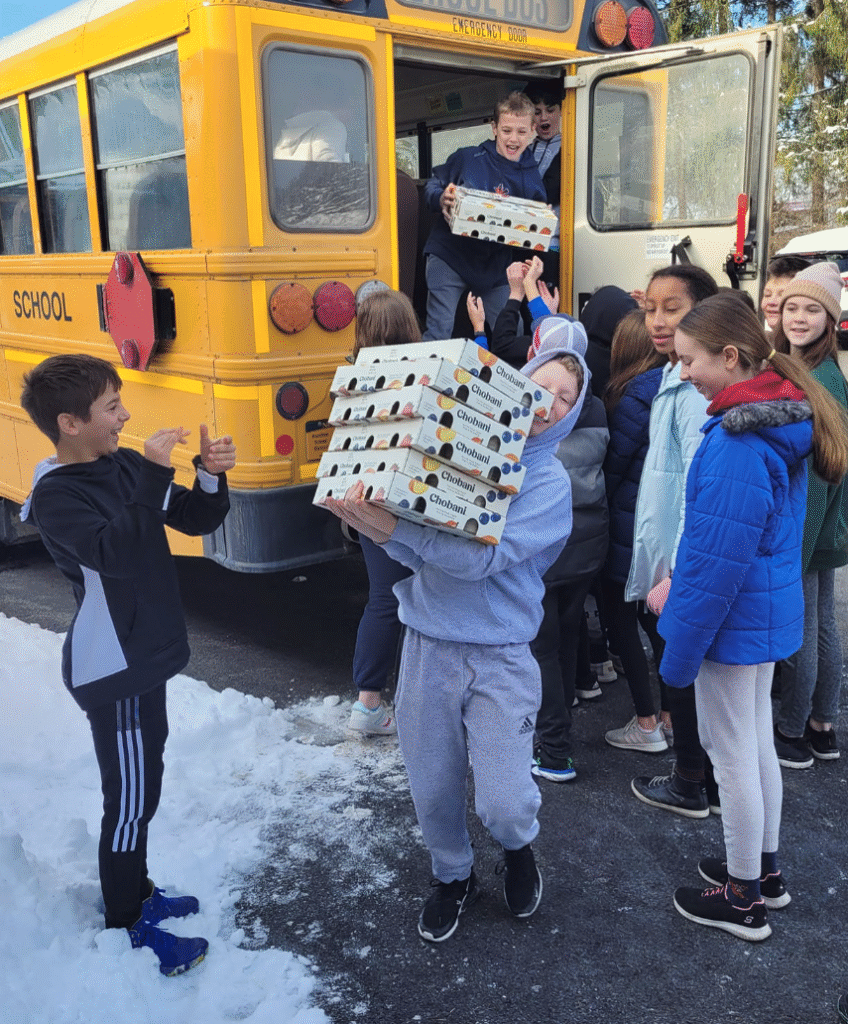
How does Discover Dairy’s “Adopt a Cow” program fit into the inspiring work her students are doing?
To take the lessons they’re learning through the Dairy Drive a step further, Monica signed up for the Adopt a Cow program two years ago. Her goal was for students to get a deeper look at dairy farms and how milk is produced by being paired with a calf from a working dairy farm.
“I’ve done the Adopt a Cow program for two years, and I absolutely love it so much. I have used it in a variety of ways. We do have a lot of farming around us, but the majority of our population has no idea where their food comes from. Many of them don’t know the milk that’s in their carton is coming from a cow,” she explained. “Maybe we can’t physically visit our adopted calf through the program, but we can go to Collins Creamery and make the connections.”
With photos and virtual updates provided through the Adopt a Cow program, Monica’s students are learning about how fast cows grow, career opportunities in agriculture, and how milk goes from the farm to the table – or in their case, their local food cupboard.
“The Adopt a Cow program helps us talk about the milk process and how it goes from cow to carton. We’ve been able to use our calf to make those connections,” Monica added. “Students love the updates and seeing the pictures. We talk about how our calf is so cute, but one day she’s going to start producing milk. I love bringing agriculture into my classroom because it is such a great learning tool for so many different elements.”
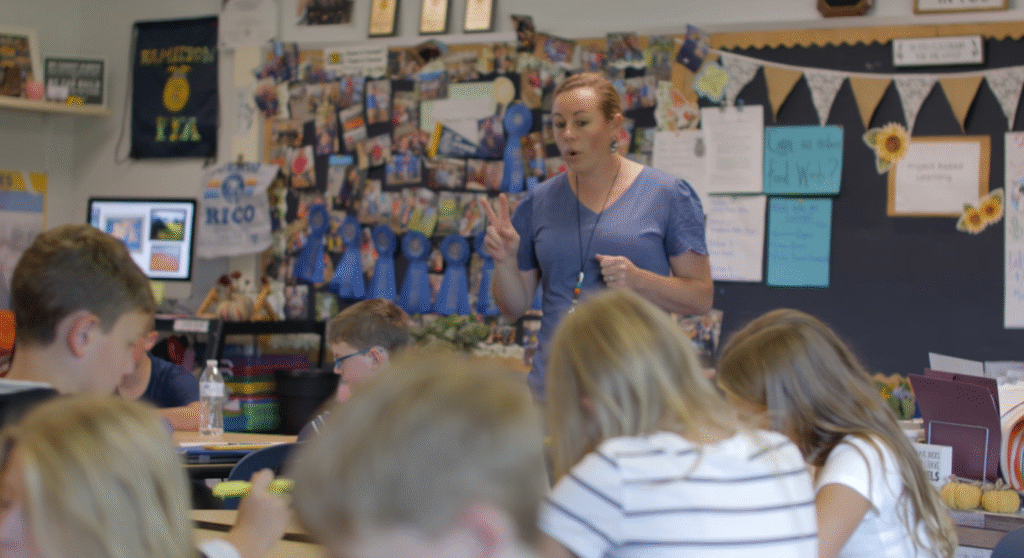
—
The Adopt a Cow Program is now open for enrollment for the 2025 school year! Click here to learn more and adopt a cow for your classroom today. The program, which impacted more than 1.7 million students last school year, is free thanks to support from Discover Dairy partners and donors.
Discover Dairy is an educational series managed by the Center for Dairy Excellence Foundation of Pennsylvania in partnership with American Dairy Association Northeast, American Dairy Association Indiana, Midwest Dairy, The Dairy Alliance, Dairy Farmers of Wisconsin, Dairy Management West, Dairy West, New England Dairy, Dairy Farmers of Washington, American Dairy Association Mideast, Dairy Council of Florida, United Dairy Industry of Michigan, Maine Dairy and Nutrition Council, and Oregon Dairy Council.
Meet Dave: Ohio Teacher Who’s Inspiring the Teachers of Tomorrow
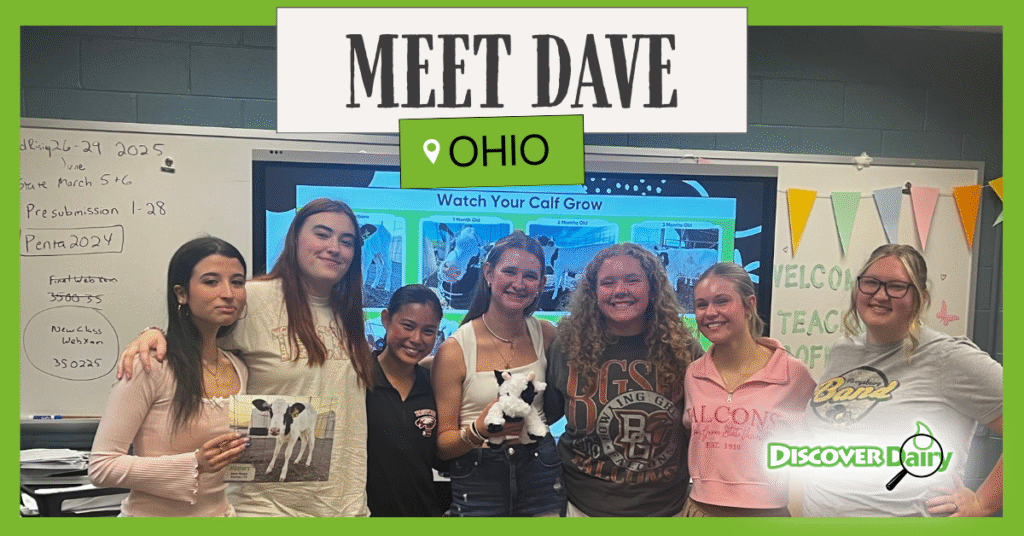
This story is part of a series of “meet & greets” with individuals who use our Adopt a Cow program to inspire you with the endless ways you can incorporate the program in the classroom and beyond!
While teaching students is important, educating the future teachers who will one day serve these students is equally meaningful – especially with labor challenges across most of the country. That’s what Dave Harms’ role is all about: he is teaching future teachers (11th and 12th graders) in Northwest Ohio.
“I work with students who want to become teachers and offers a full year of college education classes to high school juniors and seniors. We have high schoolers commuting from 16 different school districts, and we teach four college classes,” he explained. “They go out to teacher placements, get into the classroom, and see different things – such as special education, elementary, junior high, and high school settings. We want to make sure they find the right category, and then they get to choose where they’re at for their senior year.”
As Dave began interacting with these future teachers, he was looking for activities that would help prepare them for working in the elementary school setting.
“I researched activities to help prepare students for elementary teaching, and the Adopt a Cow program was suggested. We jumped in and did it, and we had a great time,” Dave shared. “It was nice to share the learning activities that go along with the program and discuss how fun activities embedded in the curriculum can embellish academic content in the elementary classroom.”
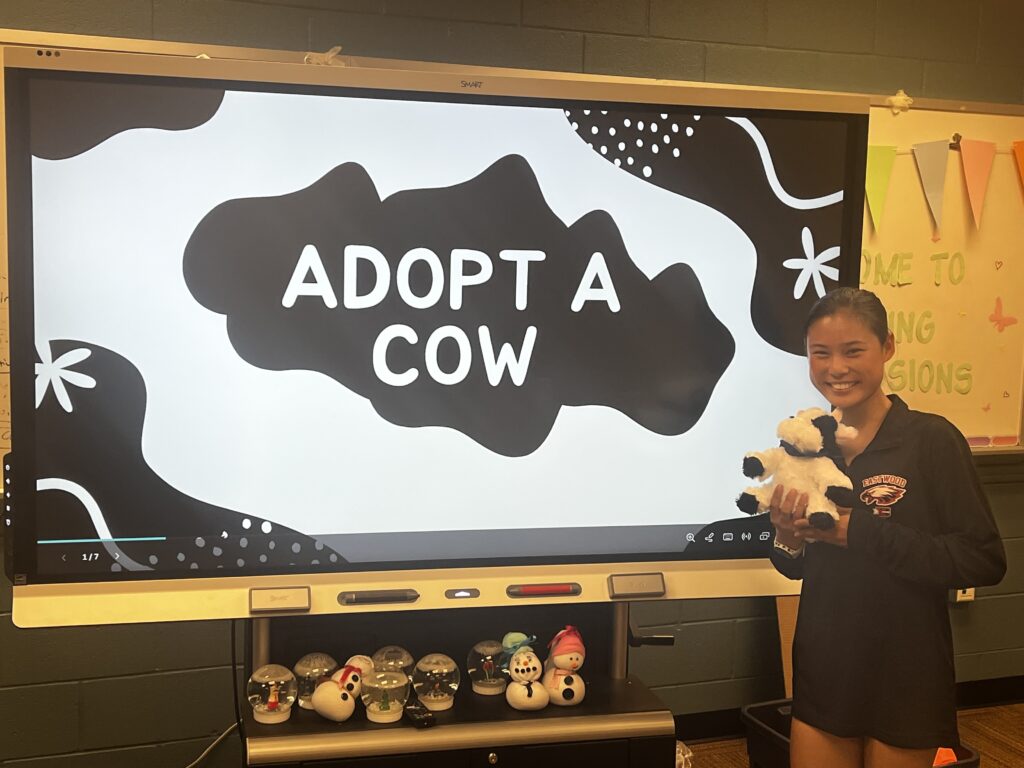
Through Discover Dairy’s Adopt a Cow program, students are paired with a calf from a nearby dairy farm – learning all about her growth, the dairy farm itself, how milk is produced, and more through regular updates, activity sheets and resources. For Dave, several components of the Adopt a Cow program have helped his students during their placements in local elementary schools.
- Dairy-themed resources and activities. “Every other week, we received an email that had different dairy lessons and activities. Nine of my students were going to elementary schools on a regular basis, so they took some of the activities and shared it with the teachers they worked with.”
- America’s Favorite Calf election. “We had our recruitment week with area schools, and we had to give a 20-minute presentation to all 16 member schools. That was during the week of the national election and the program’s ‘America’s Favorite Calf’ mock election. We incorporated our adopted calf, Peony, into our presentation and she ended up winning the mock election.”
- Live chat and lesson plans. “We did the virtual live chat with our calf. We were able to see all the different schools and see what types of questions the elementary kids were asking. We pulled up some sample lesson plans that the program sent out and went over them.”
- New connections. “In Northwest Ohio, most of my students don’t have any experience with actual cows or how much feed they get. When we watched the videos and learned what they were eating or about the different grains, they found it to be very fascinating.”
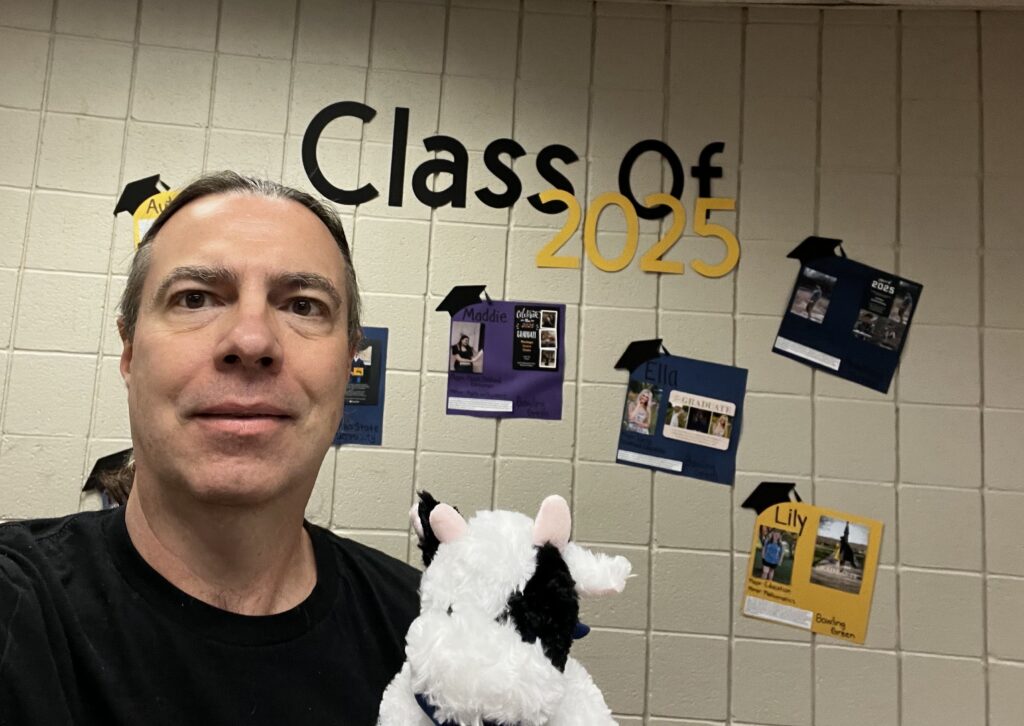
Dave’s students are highly motivated and passionate about becoming teachers, so the Adopt a Cow Program has given them leadership skills and something concrete they can bring with them into their placements at elementary schools.
“The students have to get [accepted] into college before they can even be in our program, so they’re very serious about being educators. The Adopt a Cow program allows them to go directly into the class and tell their mentor teacher, ‘Hey, I’ve got this program. I’ll run it.’ It gives them a leadership role and allows them to help the teacher out, too,” Dave added.
By investing in the teachers of tomorrow, Dave’s program is also helping with his community’s teacher shortage.
“We have such a teacher shortage that’s going on here. One of my students already got a job offer at her home school [after she receives her certifications],” he explained. “Being able to work with these students who are all so excited about becoming teachers and passionate about helping people has been an amazing change for me. It has reinvigorated me. I like to think I’m just hanging on for the ride. I provide them the opportunities to do things [like the Adopt a Cow program] and they take off and run with them.”
—
The Adopt a Cow Program is now open for enrollment for the 2025 school year! Click here to learn more and adopt a cow for your classroom today. The program, which impacted more than 1.7 million students last school year, is free thanks to support from Discover Dairy partners and donors.
Discover Dairy is an educational series managed by the Center for Dairy Excellence Foundation of Pennsylvania in partnership with American Dairy Association Northeast, American Dairy Association Indiana, Midwest Dairy, The Dairy Alliance, Dairy Farmers of Wisconsin, Dairy Management West, Dairy West, New England Dairy, Dairy Farmers of Washington, American Dairy Association Mideast, Dairy Council of Florida, United Dairy Industry of Michigan, Maine Dairy and Nutrition Council, and Oregon Dairy Council.
Meet Maryssa: Texas Elementary Teacher Who Supports Students With Agriculture Therapy Program
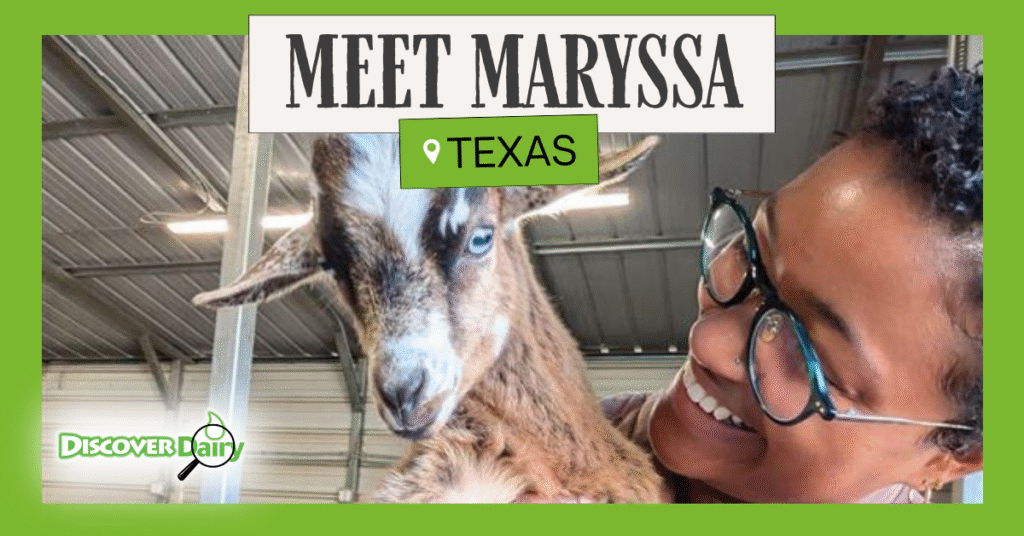
This story is part of a series of “meet & greets” with individuals who use our Adopt a Cow program to inspire you with the endless ways you can incorporate the program in the classroom and beyond!
Maryssa Adams teaches pre-k through 5th grade in a Title 1, urban school district in Texas. After noticing increasing levels of stress, anxiety and behavioral issues in students, her campus decided to create an agriculture therapy program. Discover Dairy’s “Adopt a Cow” program was the perfect complement to some of the concepts they teach students through the ag therapy program.
We sat down for a quick Q&A with Maryssa to learn more about how agriculture education is empowering her students.
How did the ag therapy program come about?
It all started with my love for animals and having been privileged enough to experience the healing they bring firsthand. The increasing levels of stress, anxiety, and behavioral issues in students was also something that we just couldn’t ignore. Our campus has always been really big about supporting the “whole child” and emphasizing the importance of social and emotional development. It just seemed like tactile and experiential learning was the way to help kiddos truly thrive.
What does the program involve?
Gardening and Plant Care: Students plant, water, weed, and harvest fruits, vegetables, herbs, and flowers. Children learn about life cycles, seasons, and sustainability.
Animal-Assisted Activities: Interaction with small farm animals (e.g., chickens and goats) Doing daily care tasks like water, food, habitat upkeep to teach empathy, responsibility, compassion, and caregiving.
Many tasks are done in pairs or small groups to foster communication, cooperation, and shared responsibility.
How are students benefitting from the ag therapy program?
Working with plants and animals improves empathy, responsibility, and teamwork. These are foundational skills for emotional intelligence and future success.
Students have shown an enhanced self-esteem and a sense of accomplishment, along with resilience and patience, through nurturing living things. Stress and anxiety has been reduced with nature based activities having calming effects, helping students feel more relaxed and focused.
There are also numerous academic benefits such as boosting engagement, enhancing understanding, making learning more meaningful and memorable, and supporting differentiated learning.
How does the Adopt a Cow program connect to what you’re doing in the ag therapy program?
We started with a welcome party where students got to “meet” our adopted cow, Aspen. The biggest piece was, with each growth update, we connected to how all living things grow and experience change. Seeing Aspen grow throughout the year was huge in helping our students reflect on their own personal growth.
Additionally, students began to understand what Aspen needs to thrive, and realized that we are not so different when it comes to food, safety, care, etc. This was the first year for us using the program, but it won’t be the last. We loved it!
Were there any creative ways you incorporated the Adopt a Cow program into the classroom? Any fun memories your students made?
We had a Meet Your Cow Day, where we shared photos, fun facts, etc. and let students write letters, draw pictures, and create a sort of “Cow Diaries”. We used this regularly for students to reflect on what they learned, express how they felt about the update, take note of something they noticed or wondered, etc.
My interactive bulletin board was a favorite, too. Students would submit guesses on calf growth, submit questions, make artwork (my calf and me), etc.
I also laminated photos of Aspen for students to keep in their self-regulation folder. It was honestly the best seeing them pull it out, look at it, take a deep breath, and calm themselves down.
Why do you think it’s important for students to learn about agriculture and where their food comes from?
When students understand how food is grown and produced, they’re more likely to make informed, healthy choices. They begin to appreciate the value of fresh, whole foods and are more willing to try fruits and vegetables—especially ones they’ve grown themselves.
Learning where food comes from fosters gratitude for farmers, animals, and the natural processes that sustain us. It teaches respect for the hard work and time involved in growing and producing food—not just grabbing it off a shelf.
Agriculture naturally integrates science, math, reading, and social studies into real-world contexts. It answers kids’ common question: “Why do I need to learn this?”—by giving them practical, meaningful examples.
As issues like climate change, food security, and sustainability become more critical, students who understand agriculture will be better equipped to contribute solutions.
It can also spark interest in future careers in science, environmental studies, nutrition, veterinary care, and beyond.
Agriculture education isn’t just about farming — it’s about empowering kids to understand, respect, and engage with the world around them in a thoughtful, grounded way.
—
The Adopt a Cow Program is now open for enrollment for the 2025 school year! Click here to learn more and adopt a cow for your classroom today. The program, which impacted more than 1.7 million students last school year, is free thanks to support from Discover Dairy partners and donors.
Discover Dairy is an educational series managed by the Center for Dairy Excellence Foundation of Pennsylvania in partnership with American Dairy Association Northeast, American Dairy Association Indiana, Midwest Dairy, The Dairy Alliance, Dairy Farmers of Wisconsin, Dairy Management West, Dairy West, New England Dairy, Dairy Farmers of Washington, American Dairy Association Mideast, Dairy Council of Florida, United Dairy Industry of Michigan, Maine Dairy and Nutrition Council, and Oregon Dairy Council.
Meet Andrea: Illinois High School Teacher Who’s Helping Students Overcome Failed Classes While Building Real Connections With Dairy Farmers
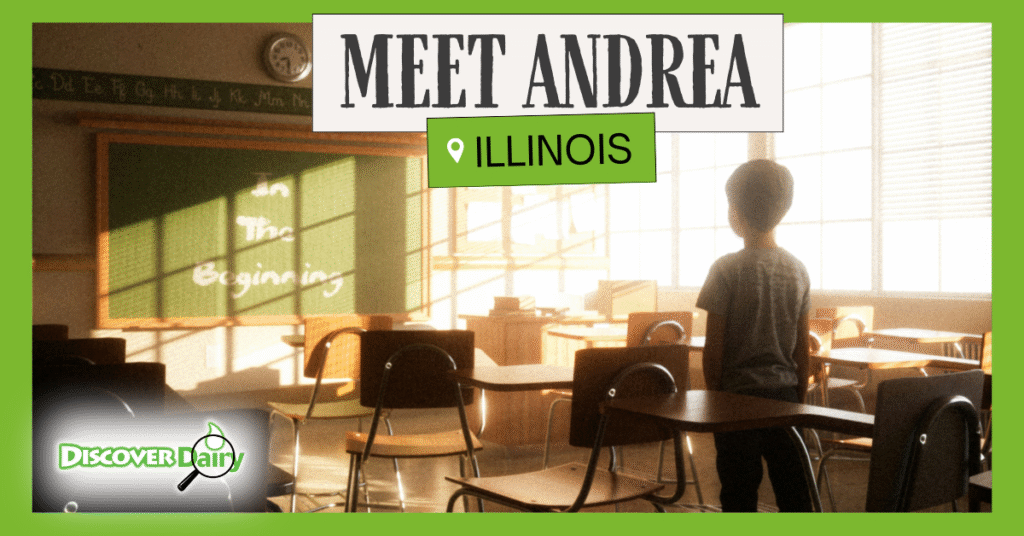
This story is part of a series of “meet & greets” with individuals who use our Adopt a Cow program to inspire you with the endless ways you can incorporate the program in the classroom and beyond!
Andrea Napier, a high school teacher from Illinois, has a challenging, but rewarding role: she helps high school students who fail certain courses recover their credits and walk across the graduation stage. She teaches students who are 14-18 years old in all general subjects – from algebra and science to English, social studies and elective courses.
“One student could be taking health this week, and next week they could be doing an elective. We monitor their progress. I talk with them [when they start my class] and I give them a minimal percentage in order for them to pass the course by the end of the school year,” Andrea shared.
While she has been helping students overcome their failed classes, she has also found a unique way to help them build real connections with dairy farmers – and each other – through Discover Dairy’s Adopt a Cow program. The program allowed them to “adopt” a calf from a nearby dairy farm.
“We started the Adopt a Cow program, which I learned about through another teacher. I thought the program could help me build somewhat of a relationship with my students and give them chances to talk in front of the class, since I really don’t get to do that in this setting,” Andrea explained. “This was just my second year using the program, but I really like it and the kids really like it.”
One of the ways the program has helped her students build connections, and express themselves in front of the class, is by sparking important conversations and memories about agriculture in their community.
“The program makes it easy to engage with students. Some kids will tell stories. One student described what he experienced visiting his grandma’s farm and how she would milk cows,” Andrea said. “The first year we did the program, we had a student whose family has a dairy farm. She talked to my class about what she does and how there’s never a day off from work. She also named a couple local pizza places in our area that buy their cheese from her farm. It was very interesting for students to hear that from a peer.”
The Adopt a Cow program has also helped Andrea’s students connect with real farmers and gives them a more tangible way to ask real-time questions. Andrea has found this especially valuable with the rapid advancement of technology that makes it difficult for students to actually connect.
“A lot of high schoolers just want AI to tell them the answers – instead of hearing firsthand experiences from someone else and spending time talking about it,” Andrea added. “The Adopt a Cow program gives them a little more knowledge. When we connect to a cow and share examples with them, I think it’s more meaningful to students. It’s more real and tangible. Kids will raise their hand and bring things up. They’ll chime in on experiences they’ve had.”
Along with conversation and connection, Andrea incorporated some of the program’s dairy-themed activities into her class once a month. They also tuned in to the Adopt a Cow live chat, where they had the chance to virtually meet their adopted calf and host farm.
As Andrea makes deliberate time to motivate and connect with every one of her students throughout the year, the ultimate reward is when they walk across the graduation stage and overcome the challenges they faced.
“Any teacher could probably tell you that there are some days when you go home and wonder if you’re doing enough for these kids. Another teacher helped me realize that you have to start developing relationships with them and get them to start talking to you. It’s so true. I could easily have behavior issues in my room, but I really don’t, because I talk to them or I pull them out in the hall and reason with them,” she added. “And when I see the reward of them getting their diploma, I’m really thrilled. They listened, did what they needed to get their credit back, overcome their mistakes, and graduated and moved forward from there.”
—
The Adopt a Cow Program is now open for enrollment for the 2025 school year! Click here to learn more and adopt a cow for your classroom today. The program, which impacted more than 1.7 million students last school year, is free thanks to support from Discover Dairy partners and donors.
Discover Dairy is an educational series managed by the Center for Dairy Excellence Foundation of Pennsylvania in partnership with American Dairy Association Northeast, American Dairy Association Indiana, Midwest Dairy, The Dairy Alliance, Dairy Farmers of Wisconsin, Dairy Management West, Dairy West, New England Dairy, Dairy Farmers of Washington, American Dairy Association Mideast, Dairy Council of Florida, United Dairy Industry of Michigan, Maine Dairy and Nutrition Council, and Oregon Dairy Council.
Meet Rylee, Elementary Teacher From Idaho with Passion for Agriculture
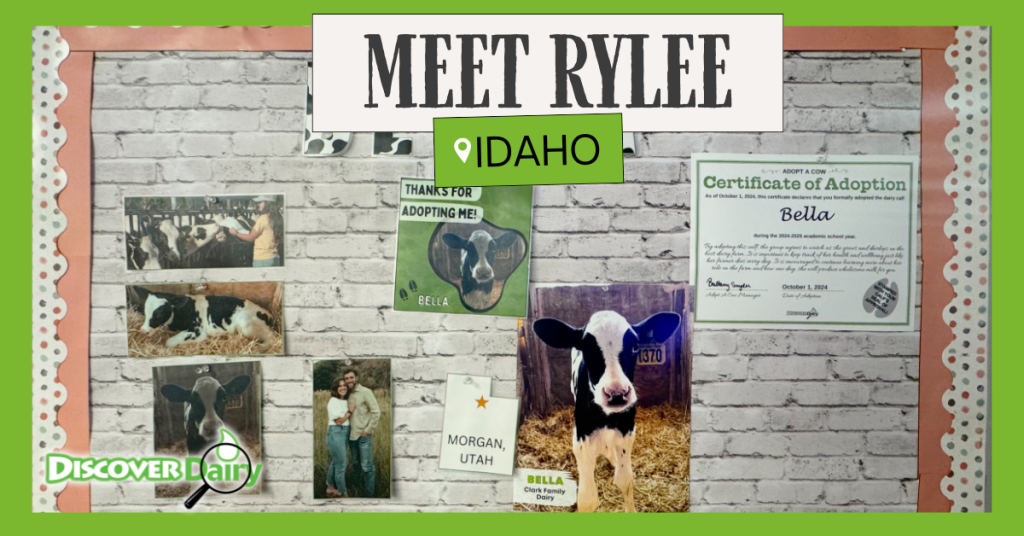
This story is part of a series of “meet & greets” with individuals who use our Adopt a Cow program to inspire you with the endless ways you can incorporate the program in the classroom and beyond!
Rylee Murdoch teaches third grade (soon to be fourth grade) in Idaho Falls, Idaho. After growing up on a beef cattle ranch, she has always been passionate about introducing her students to the world of agriculture. When she heard about Discover Dairy’s Adopt a Cow Program, she knew she wanted to sign up her classroom. We sat down with her for a Q&A on how she utilized the program with her elementary students.
Why did you decide to sign up for the Adopt a Cow program?
I saw a video on TikTok and knew I had to sign up. I grew up on a beef cattle ranch so I thought it would be fun to incorporate agriculture into my classroom. This is only my first year teaching.
What grade do you teach?
I teach 3rd grade. We have a wide range of demographics. We have very nice neighborhoods all the way to a couple of homeless shelters in our school boundaries.
What was your favorite part of the program?
I loved having a class pet without having to take care of it. We did a lot of writing reflections about our cow, Bella. Discovery Dairy was so fun to have in my classroom! I am moving up to fourth grade next year, and my students have been asking if I am doing it again. They absolutely loved it!
Why is it important to teach students where their milk and food comes from?
When I was in high school in an agricultural class, we called numbers located in big cities. We asked them questions like, “Where do we get chocolate milk?” We were baffled by their answers. I grew up around agriculture and I think that even if kids don’t, they should be educated about agriculture and dairy farming.
—
The Adopt a Cow Program is now open for enrollment for the 2025 school year! Click here to learn more and adopt a cow for your classroom today. The program, which impacted more than 1.7 million students last school year, is free thanks to support from Discover Dairy partners and donors.
Discover Dairy is an educational series managed by the Center for Dairy Excellence Foundation of Pennsylvania in partnership with American Dairy Association Northeast, American Dairy Association Indiana, Midwest Dairy, The Dairy Alliance, Dairy Farmers of Wisconsin, Dairy Management West, Dairy West, New England Dairy, Dairy Farmers of Washington, American Dairy Association Mideast, Dairy Council of Florida, United Dairy Industry of Michigan, Maine Dairy and Nutrition Council, and Oregon Dairy Council.
Meet Eva: Bus Driver From Southwest Ohio Who Adopted a Cow for Her Bus

This story is part of a series of “meet & greets” with individuals who use our Adopt a Cow program to inspire you with the endless ways you can incorporate the program in the classroom and beyond!
Eva Cundiff, a bus driver for West Carrollton City Schools in Southwest Ohio, has multiple bus routes and everyone from preschoolers to twelfth-graders on her bus in a given week. So, how does she engage students that she might only see for a few minutes a day?
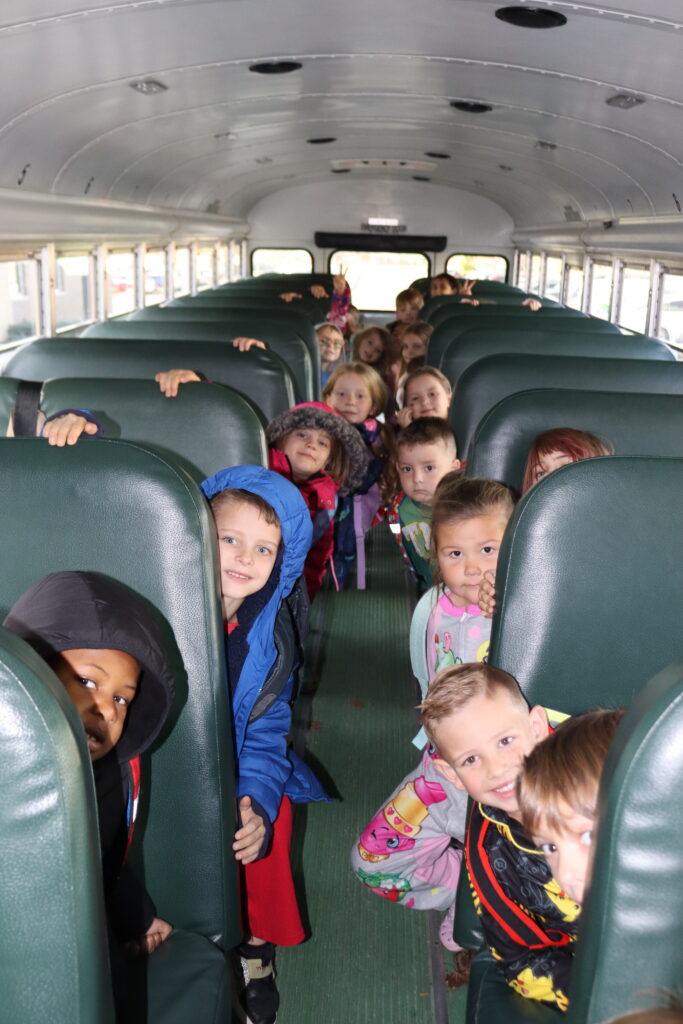
“I’ve been a bus driver since 1995. Through the years of driving, things have changed. Your normal home life in 1995 is nowhere near what it is now. The money’s not there for food. In our district, we’re fortunate that every child gets free breakfast and free lunch. But our kids need structure. So if I can help one kid smile in a day, I’m going to do it,” she shared.
By providing this structure and a friendly face, she hopes it makes her bus a fun and inviting place for students. Eva also describes it as a “mobile classroom,” where she can make meaningful connections and learning moments with students. That’s what inspired her to try out Discover Dairy’s “Adopt a Cow” program for her bus.
“During the summer, I typically give out ice cream or different things. I also have a newer bus that has Bluetooth, so I create playlists and the kids all enjoy singing songs and having a great time. Anytime I take a group of kids on a field trip, I always try and go in with them, too. With my bus already being kind of like a mobile classroom, I thought we could adopt a cow and try to gear it towards the bus.”
To display the adopted cow prominently on her bus, Eva decided to get a personalized decal with their calf, Peony, so the kids could see her every day. She also offered the program’s coloring sheets to her students as a take-home activity and shared dairy snacks like cheese sticks and yogurt pouches. Eva also thought outside the box when it came to group activities like butter-making – and how she could make them work in a bus setting.
“I wanted to get heavy cream, put it in a plastic container with a lid, let the kids pass it around on the bus, and take turns shaking it the whole time we’re driving to see if they can see it start clumping up to make butter,” Eva shared. “That way, everybody gets to do something. I’d have it finished up by the end of the day when they come back on the bus in the afternoon and they would get to see that it did turn into butter.”
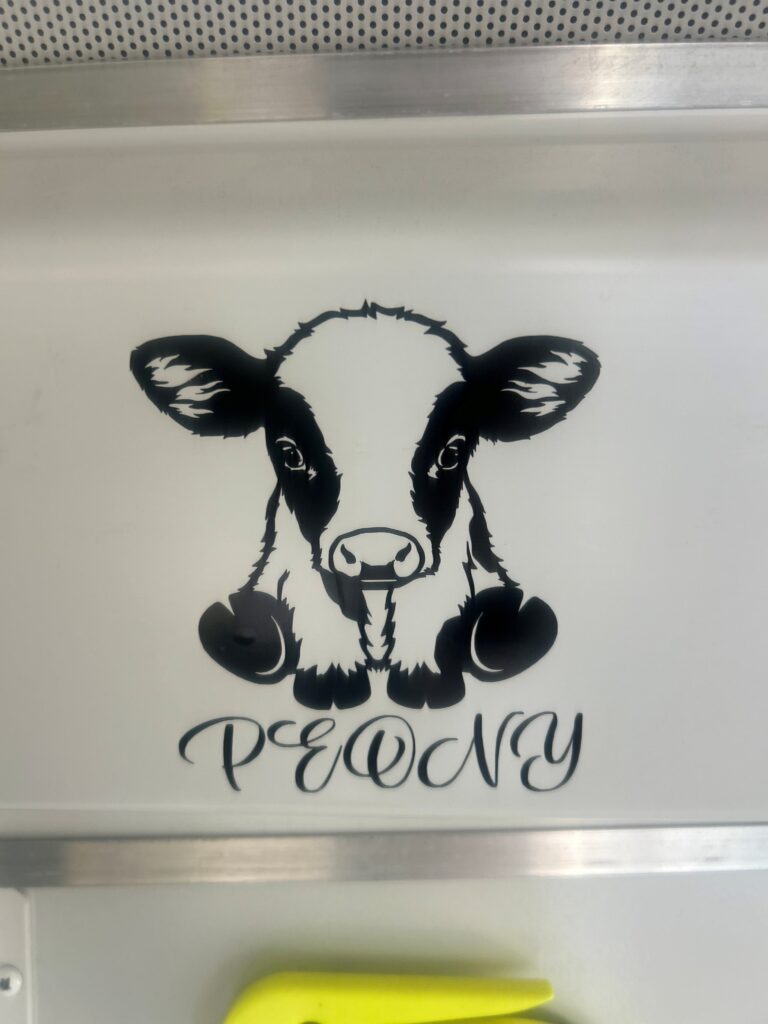
With many of her students coming from low-income backgrounds, Eva finds it important to teach students where their food comes from and help address food insecurity in a small way.
“I think it’s important to teach students these lessons, especially because of the fact that food is so expensive and not every family has access to it. If they’re learning where it comes from, maybe they might think about what they could do when they grow up and help feed their family,” she added.
Eva has also used the limited time she has with students each day, and the material provided through the Adopt a Cow program, to teach important lessons about nutrition and the world.
“My kids know how to sit and behave because I have expectations for them to keep them safe. I figure while I’ve got their attention and I can mold their minds, why not start instilling ideas about healthy choices? We need to look out for healthy foods to keep our bones strong,” Eva shared.
The Adopt a Cow Program is now open for enrollment for the 2025 school year! Click here to learn more and adopt a cow for your classroom today. The program, which impacted more than 1.7 million students last school year, is free thanks to support from Discover Dairy partners and donors.
Discover Dairy is an educational series managed by the Center for Dairy Excellence Foundation of Pennsylvania in partnership with American Dairy Association Northeast, American Dairy Association Indiana, Midwest Dairy, The Dairy Alliance, Dairy Farmers of Wisconsin, Dairy Management West, Dairy West, New England Dairy, Dairy Farmers of Washington, American Dairy Association Mideast, Dairy Council of Florida, United Dairy Industry of Michigan, Maine Dairy and Nutrition Council, and Oregon Dairy Council.
Meet Naomi: Fifth-Grade Special Education Teacher in Connecticut

This story is part of a series of “meet & greets” with individuals who use our Adopt a Cow program to inspire you with the endless ways you can incorporate the program in the classroom and beyond!
Naomi Niemann may have grown up on a dairy farm, but not all of her students are familiar with what farmers actually do and where their food comes. Naomi decided to sign up for Discover Dairy’s Adopt a Cow program and introduce some of these concepts to her fifth-grade special education students in Mansfield, Connecticut.
“I grew up on a dairy farm when I was a child, so I naturally just love cows. I saw the program and I thought, what a fun way to bring some engagement material to students and have a cow they can follow along with,” she shared. “I work with students of lower socioeconomic status given my position. They don’t have a lot of exposure to where their food comes from, and I think that’s essential as we grow. Where do our things come from and how do we get these things? That’s a big focus of what I instructed on [with the Adopt a Cow program].”
After being paired with Oakridge Dairy, a dairy farm about 30 minutes away from most of her students, Naomi was able to spark community connections with her classroom.
“The kids were really excited when they realized that because our farm was fairly close, they have actually seen the products from the farm in the stores around us,” she added.
The Adopt a Cow program not only provides regular updates about their adopted calf and host farm throughout the year, but it has several lessons, videos and activities that bring careers in agriculture to life for students.
“Some of the materials that were given were really helpful in looking at different jobs around the farm. We do a lot of career exploration, so we could do investigatory research on those agriculture career paths and what kind of education people need,” Naomi shared.
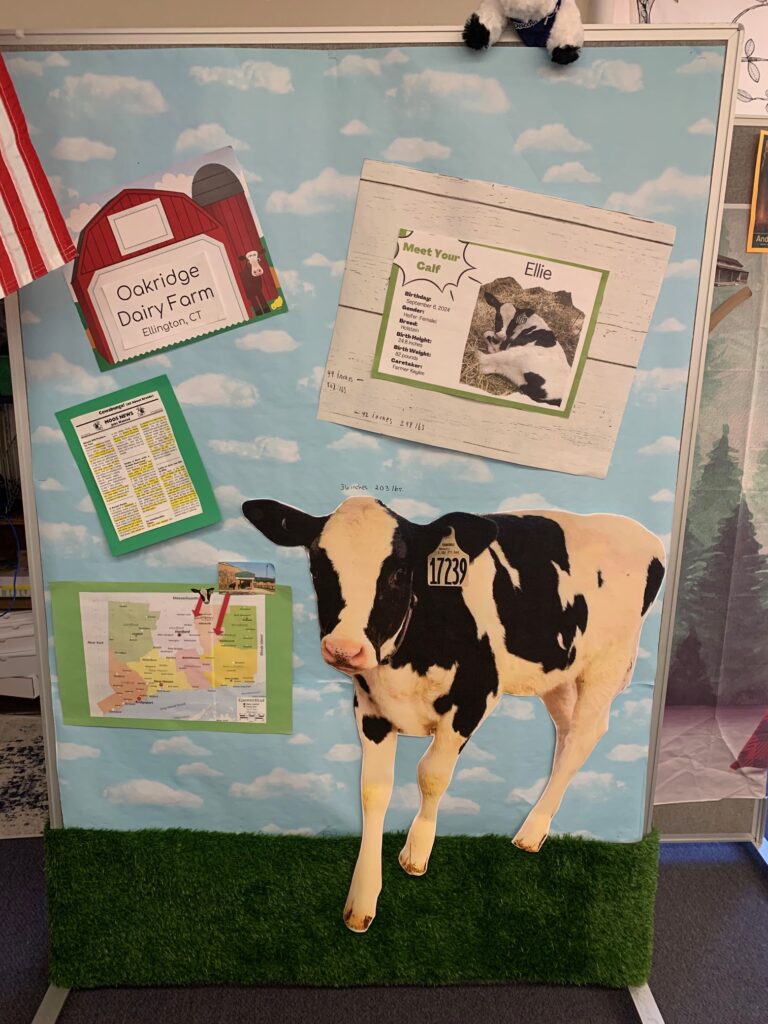
When it came to specific subject areas, the Adopt a Cow program helped Naomi strengthen some of the math lessons she was teaching. For example, as her students learned about the different breeds of dairy cows, they were able to practice comparing and contrasting skills. When they chatted directly with dairy farmers, she says they were able to learn more about data prediction.
“I took some of the items from the program and aligned them with the content and targeted skills we were working on. When we asked our farmers questions, we used their answers to help us make more accurate, data-driven predictions,” she explained. “When our calf was three months old, our media specialist made a life-size cow for us along with a pasture for her on one of our movable bulletin boards. The kids could get the tape measure out and mark her growth on the growth chart [that the program provided]. One student was working on linear graphs and prediction, while others tried to make the measurements. The key was, the cow helped promote students’ engagement with those subject areas.”
Overall, the anticipation for their adopted calf’s updates and how fast she was growing kept Naomi’s students engaged and excited all year long.
“The kids really loved getting the calf updates. If I delayed [sharing] the cow update for a day or two, they would get really disappointed with me. So it definitely promoted their engagement,” she added.
The Adopt a Cow Program is now open for enrollment for the 2025 school year! Click here to learn more and adopt a cow for your classroom today. The program, which impacted more than 1.7 million students last school year, is free thanks to support from Discover Dairy partners and donors.
Discover Dairy is an educational series managed by the Center for Dairy Excellence Foundation of Pennsylvania in partnership with American Dairy Association Northeast, American Dairy Association Indiana, Midwest Dairy, The Dairy Alliance, Dairy Farmers of Wisconsin, Dairy Management West, Dairy West, New England Dairy, Dairy Farmers of Washington, American Dairy Association Mideast, Dairy Council of Florida, United Dairy Industry of Michigan, Maine Dairy and Nutrition Council, and Oregon Dairy Council.
Meet Paula: Cafeteria Manager in Tennessee Elementary School

This story is part of a series of “meet & greets” with individuals who use our Adopt a Cow program to inspire you with the endless ways you can incorporate the program in the classroom and beyond!
Paula Satterfield works in food services at a Tennessee elementary school cafeteria. We sat down with her for a quick Q&A about how the Adopt a Cow program fits into their school cafeteria.
How long have you participated in Adopt a Cow? What grades do you serve?
This is my first year adopting a cow. My central office group thought this would be a good idea for our students. We are an elementary group, so we serve Pre-K-5th grade.
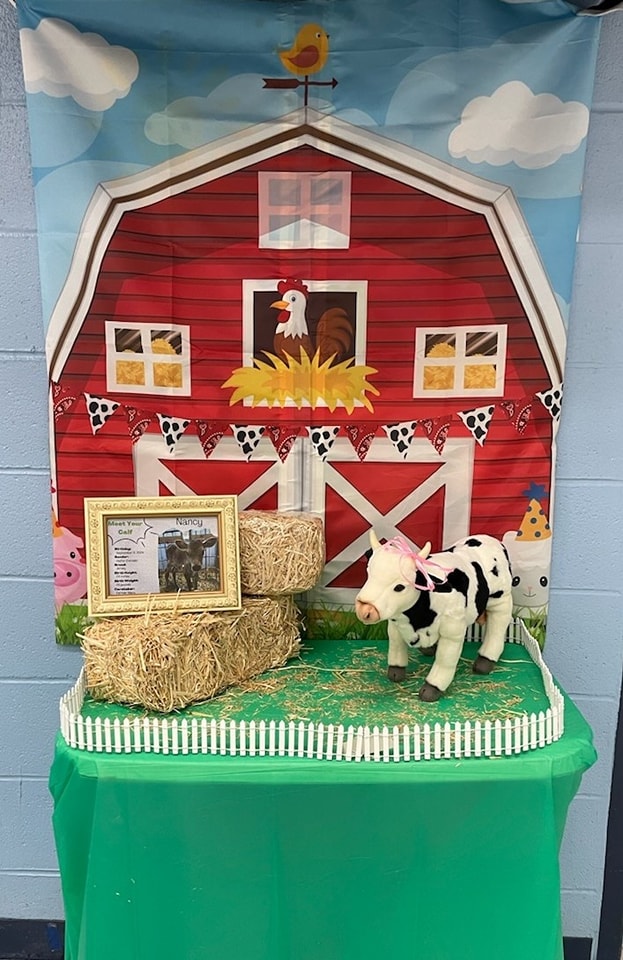
Are there any exciting moments or creative ways you have included the program in the lunch room?
We have made up a small area and put a barn scene up as well as the picture of our cow and a stuffed cow. We’ve been using this for incentives for the kids to be good while in the cafeteria as well as encourage them to drink milk.
I have enjoyed seeing the kids look at the pictures, ask questions, and just be happy. A lot of the children live on farms, so they are very interested in watching our little cow grow.
Why do you think it’s important for students to learn about dairy farming and where their food comes from?
Farming is very important to our lives. The more we can explain it, the more it will increase their desire to help keep the farming business alive. Hard work is something most of our kids don’t understand and how much time is involved.
The Adopt a Cow Program is now open for enrollment for the 2025 school year! Click here to learn more and adopt a cow for your classroom today. The program, which impacted more than 1.7 million students last school year, is free thanks to support from Discover Dairy partners and donors.
Discover Dairy is an educational series managed by the Center for Dairy Excellence Foundation of Pennsylvania in partnership with American Dairy Association Northeast, American Dairy Association Indiana, Midwest Dairy, The Dairy Alliance, Dairy Farmers of Wisconsin, Dairy Management West, Dairy West, New England Dairy, Dairy Farmers of Washington, American Dairy Association Mideast, Dairy Council of Florida, United Dairy Industry of Michigan, Maine Dairy and Nutrition Council, and Oregon Dairy Council.
2025 Teacher Appreciation Week: Meet 10 Teachers Who Are Making a Difference
Happy Teacher Appreciation Week! Teachers: THANK YOU for all the energy, support and creativity you pour into your classrooms every day. Our Discover Dairy teachers have a strong passion for agriculture, so this week, we want to showcase a few who are going above and beyond for their students and communities. Thank you to everyone who submitted nominations for this spotlight series! We know our teachers are the heart of our school communities, and we are inspired by the difference you are making.
Meet Amber Stout
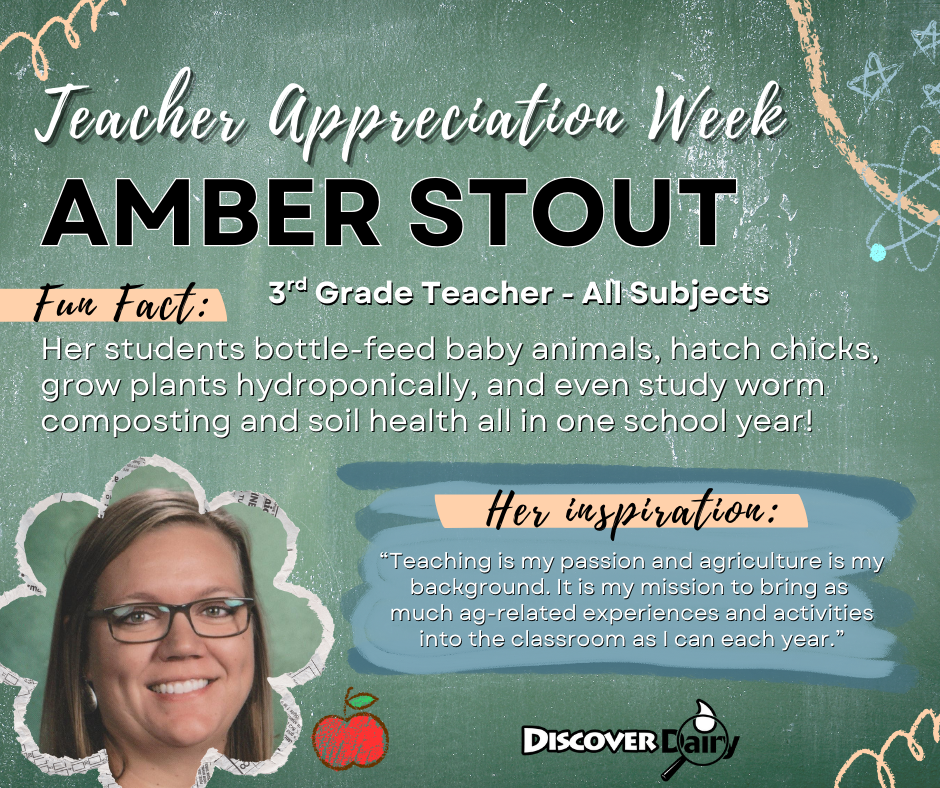
Meet Amber Stout, a dedicated 3rd grade teacher at Jefferson Elementary who goes above and beyond to bring agriculture into her classroom through the Discover Dairy and Adopt a Cow programs! 🐄🌱 Although she doesn’t come from a dairy background, Amber lives on a farm and uses her passion for agriculture to create unforgettable learning experiences for her students. From hatching chicks and spinning wool to bottle-feeding baby lambs and studying soil health, her classroom is full of hands-on activities that spark curiosity and make learning come alive.
Amber’s favorite classroom memories involve field trips to her own farm during lambing and kidding season—where students witness live animal births, feed baby animals, and learn how farm products like milk, wool, and meat are used in everyday life. She even brings in live animals like turkeys and lambs to teach about survival adaptations, wool production, and ruminant digestion.
With incubators, hydroponics, compost experiments, and expert guest speakers, her students are immersed in lessons that connect science, agriculture, and real-world problem solving.
“Making connections is what makes education so meaningful,” Amber says. “My hope is that my students remember these experiences, learn from them, and acquire a desire to know more.”
Meet Monica Chamberlain
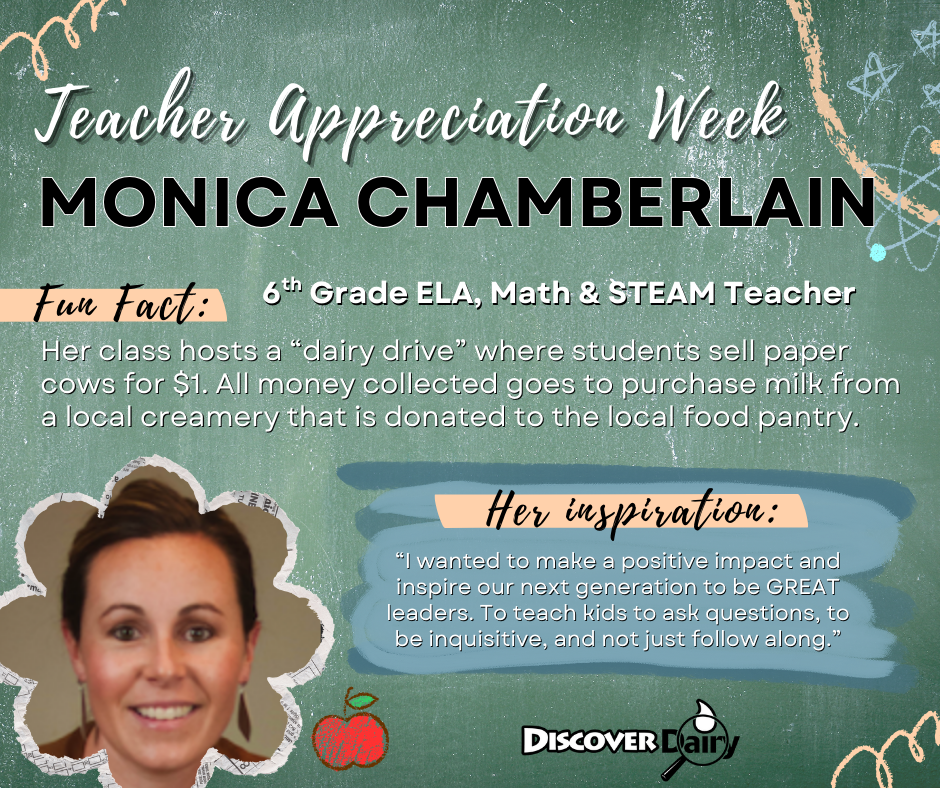
Monica Chamberlain, a 6th grade ELA, Math, and STEAM teacher at Hamilton Central School, is lighting the way for future leaders by encouraging her students to ask questions, think critically, and learn by doing. Through Discover Dairy and the Adopt a Cow program, she’s helping her students connect with agriculture in meaningful and creative ways—even though she doesn’t come from a dairy background herself.
One of Monica’s most inspiring classroom moments came from a student who struggled with traditional learning and often found himself in the office. But when Monica introduced hands-on drone lessons, everything changed. He became the class leader, successfully fixing drones and helping others troubleshoot. “When we meet kids where they are and give them an opportunity to learn in a way that works for them, we get to see great things happen!” Monica says.
Monica also leads a powerful initiative called the Dairy Drive—where students sell paper cows for $1, using the money to purchase milk from Collins Creamery and donate it to their local food cupboard. Not only do students learn about food insecurity and supporting local farmers, but they also build life skills like money management, communication, and resilience. For three years running, her students have raised enough to provide milk for their community for an entire year. That’s more than just a fundraiser—it’s a lesson in compassion, leadership, and real-world impact.
Meet Tanya Scarpato
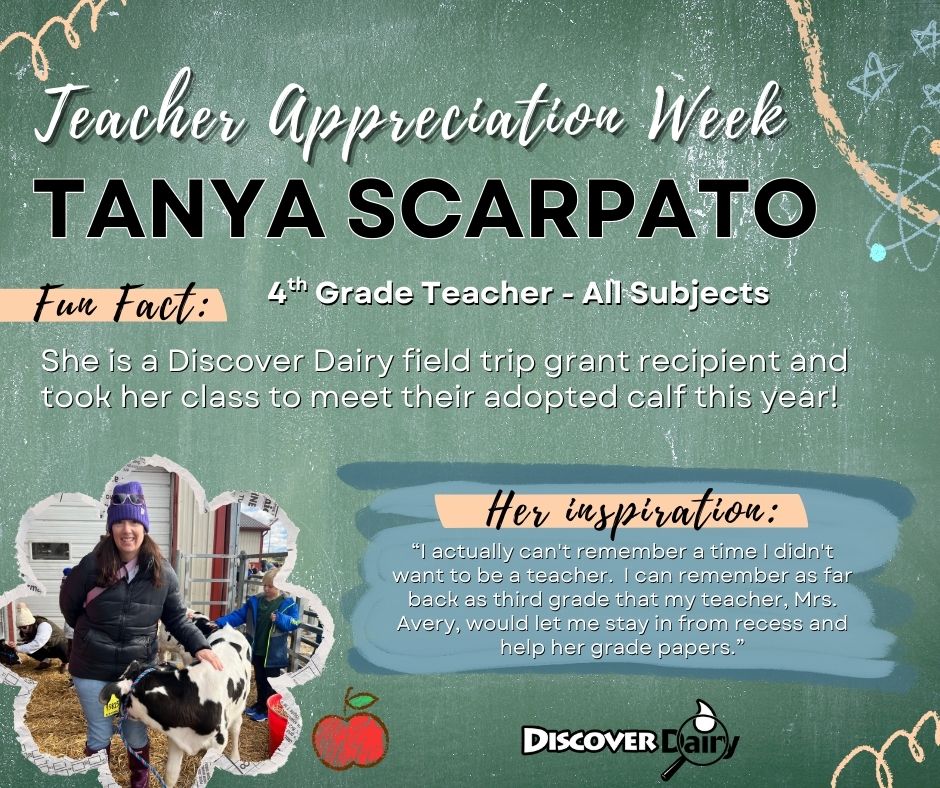
Say hello to Tanya Scarpato, a dedicated 4th grade teacher at Wyncote Elementary who brings agriculture to life in the classroom through the Adopt a Cow program! Even without a dairy background, Tanya has participated in the program for five years, finding new ways each year to make learning about the dairy industry meaningful and fun for her students.
One of her standout teaching moments came after her class received a Discover Dairy grant—allowing them to visit a working dairy farm, make butter from heavy cream, and wear personalized cow-print shirts to celebrate the experience. This year, Tanya and several students even visited Zahncroft Dairy on a Saturday to meet their adopted calf in person for the first time!
Her creative, hands-on approach is especially impactful in her urban classroom near Philadelphia, where many students have limited exposure to agriculture.
“It was such a great hands-on, real-world experience for my class and it kept them excited about the dairy industry and agriculture, which is especially awesome since we live close to a major city, Philadelphia, and not in a rural area.”
Meet Jenna Calfo
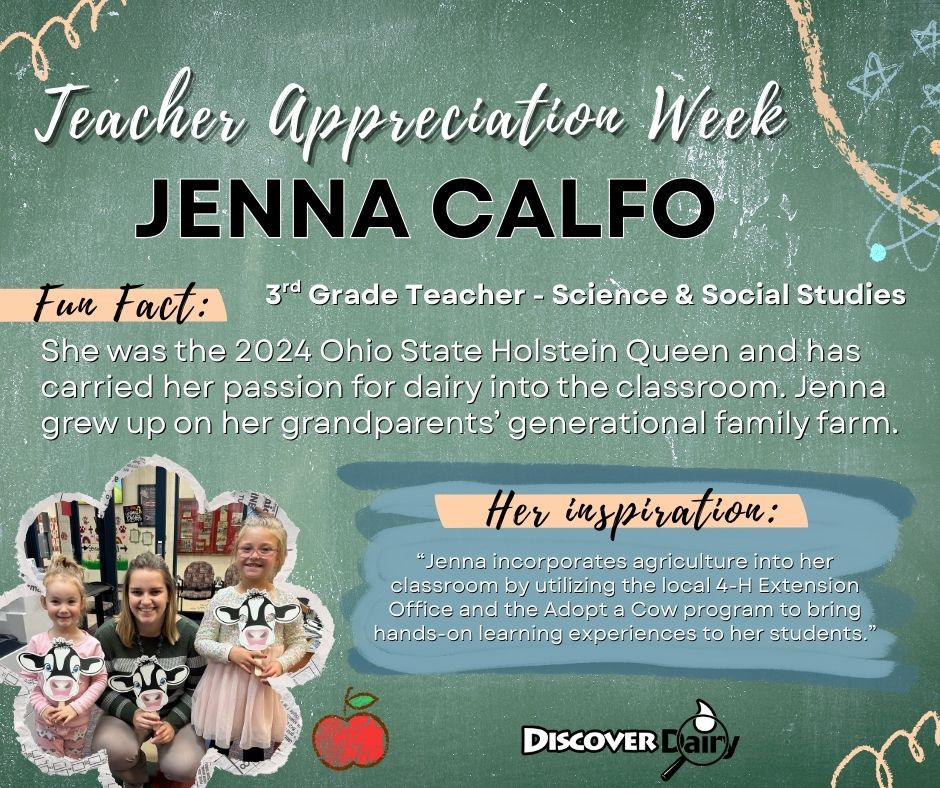
Meet Jenna Calfo, a first-year 3rd grade Science and Social Studies teacher at New London Elementary who brings her lifelong passion for agriculture straight into the classroom! As the 2024 Ohio State Holstein Queen and someone who grew up on her family’s dairy farm, Jenna is proud to share her love of Holsteins, farm life, and agricultural education with both students and staff.
Jenna uses her background in 4-H and her family’s farming legacy to create meaningful, hands-on lessons for her students. From soil health experiments to seed germination projects, she brings science to life with the help of her local 4-H Extension Office. Her classroom isn’t just about learning facts—it’s about understanding the real-world role of agriculture and developing a respect for where our food comes from.
Through her participation in the Adopt a Cow program, Jenna’s students follow the growth of a calf and learn about proper animal care, dairy nutrition, and how farming supports the local community. These activities offer powerful connections between classroom lessons and everyday life, and Jenna’s energy and enthusiasm make those lessons unforgettable.
“Miss Calfo is so passionate about agriculture, and I believe she will continue to be a strong advocate for agriculture,” shares a colleague. “She’s a positive voice in our rural school community, and we’re lucky to have her!”
Meet Jennifer Bailey
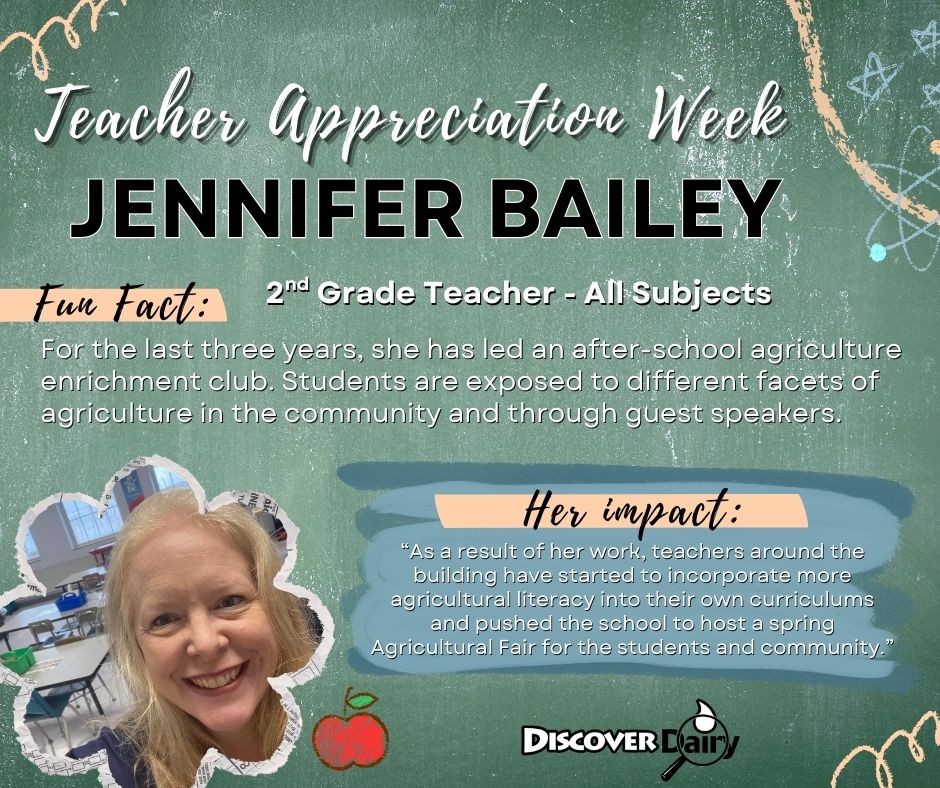
Jennifer Bailey is an outstanding educator with a deep commitment to teaching agricultural literacy and helping her students understand where their food comes from and how agriculture shapes their lives. Even without a dairy background, Jen has embraced programs like Discover Dairy and Adopt a Cow for over three years—making ag education a vibrant part of her classroom and school culture.
Jen’s dedication goes far beyond the classroom. She has been named a NY Ag in the Classroom Teacher of the Year, presented at the National Ag in the Classroom convention in Florida, and continues to lead innovative programs like an after-school ag enrichment club. Her students have explored agriculture firsthand—visiting local farms, engaging with guest speakers, and learning about the wide range of careers in the ag industry.
This year, Jen is also leading weekly food-focused lessons for second grade classes through the Pilot Light Food Program, giving students early and engaging exposure to food systems and nutrition.
Her passion is contagious—spreading to fellow teachers and inspiring a school-wide movement. Thanks to her leadership, more staff are incorporating ag literacy into their curriculum, and the school is working toward hosting its first-ever spring Agricultural Fair!
“Jen’s adventurous spirit and love of learning have sparked deep-rooted connections with our rural community and built stronger relationships between students and the communities they are from.”
Meet Maryssa Adams Brown
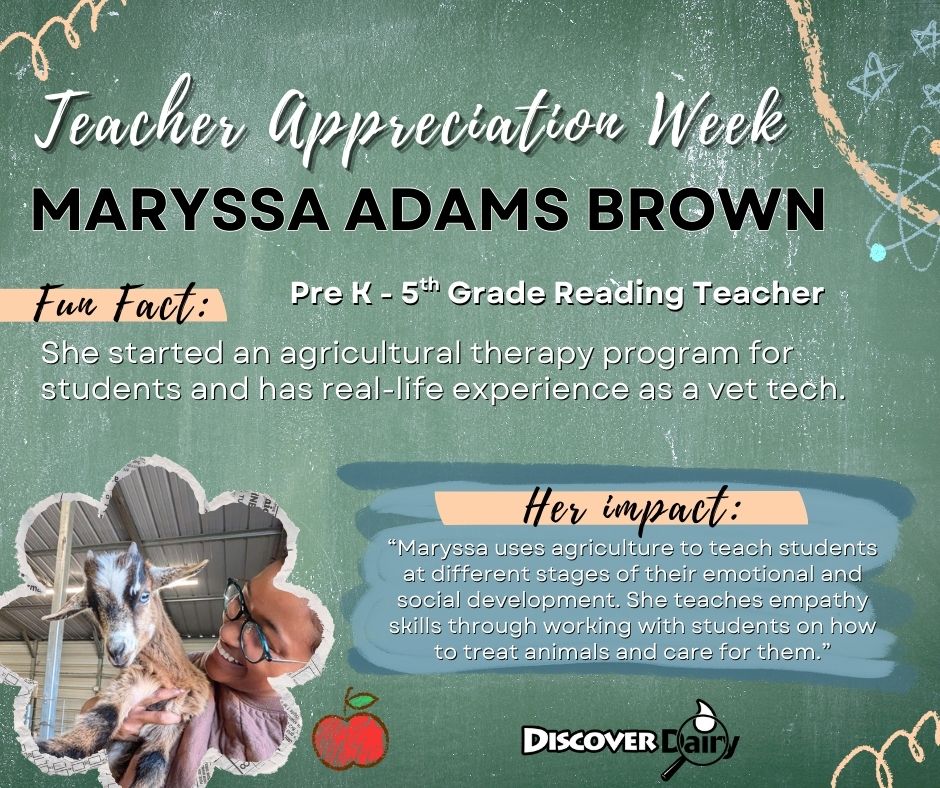
Maryssa Adams Brown is a reading interventionist and counseling teacher for PreK through 5th grade students—and a true champion for agricultural education and emotional growth. With a dairy background and a heart for both animals and kids, Maryssa has turned her passion into purpose through an incredible agricultural therapy program on campus.
Recognizing the need for more hands-on learning, Maryssa personally invested time, money, and heart into building the program from the ground up. She introduced goats to the campus, expanded student access to the school garden and chickens, and even wrote a grant to help sustain the effort—leading to PTA support and community involvement. The impact has been remarkable: students are developing self-regulation, empathy, and stronger connections to nature.
Through the Adopt a Cow program, Maryssa brought the entire school together around their adopted calf, Aspen. From updates to coloring contests, she’s fostered excitement and curiosity in students of all ages and backgrounds—many of whom are experiencing animal care for the first time.
Maryssa uses agriculture as a powerful tool to teach empathy and social-emotional skills, creating a compassionate, growth-focused environment for all learners. She is deeply valued not only by students and colleagues, but by the animals in her care, too!
“All students benefit from working with our garden and animals. We’ve seen significant growth in students’ ability to care for others and connect with the world around them—thanks to Maryssa’s vision and heart.”
Meet Tracye Robinson
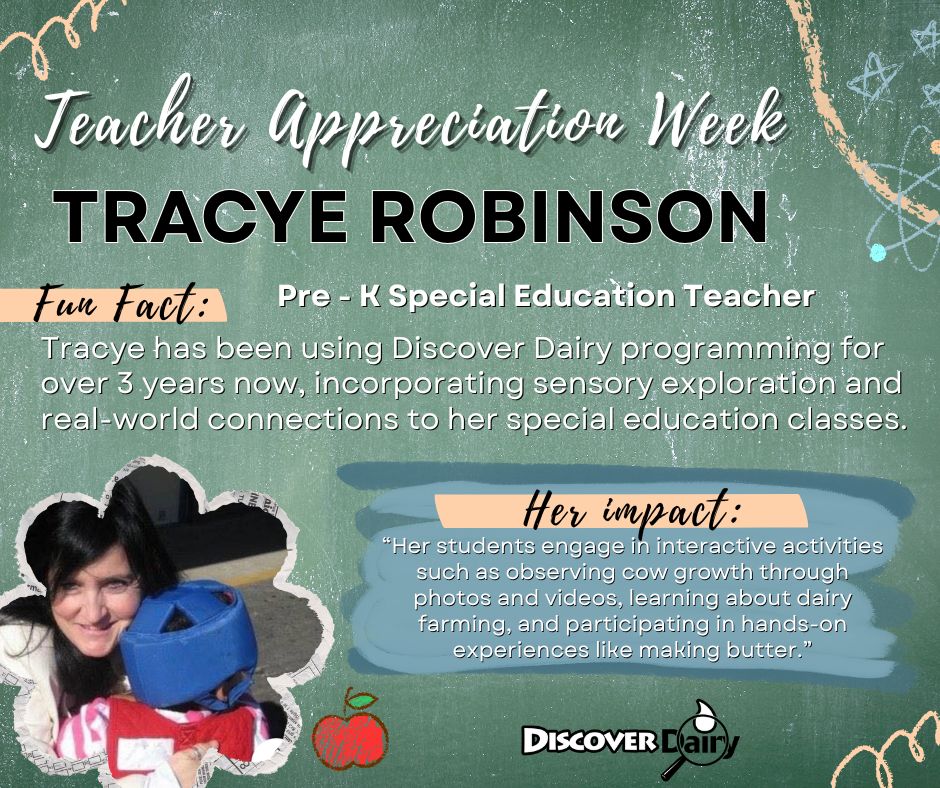
Tracye Robinson is a standout educator in early childhood special education, whose creativity and commitment to her students have made a lasting impact. For the past three years, Tracye has seamlessly integrated the Discover Dairy and Adopt a Cow programs into her PreK classroom, turning them into hands-on, engaging learning experiences that are accessible for all her students.
With a passion for fostering inclusivity and supporting her students’ diverse needs, Tracye creates an environment where learning is not just about academics, but also about developing empathy, responsibility, and curiosity. Through the Adopt a Cow program, her students explore agriculture, science, and social-emotional learning in ways that nurture sensory development, language acquisition, and cognitive skills. Whether it’s making butter, observing cow growth, or engaging with sensory activities tied to farm life, Tracye ensures each student has a meaningful connection to the material.
Tracye also fosters community involvement by sharing the excitement of the program with families through newsletters and home activities. Her innovative approach brings the world of agriculture into the lives of her students, helping them grow in both knowledge and character.
“Tracye’s dedication to making learning accessible and enriching for her students with special needs is a testament to her incredible passion and expertise as an educator. She always finds new ways to bring learning to life!”
Meet Corinne Hooten
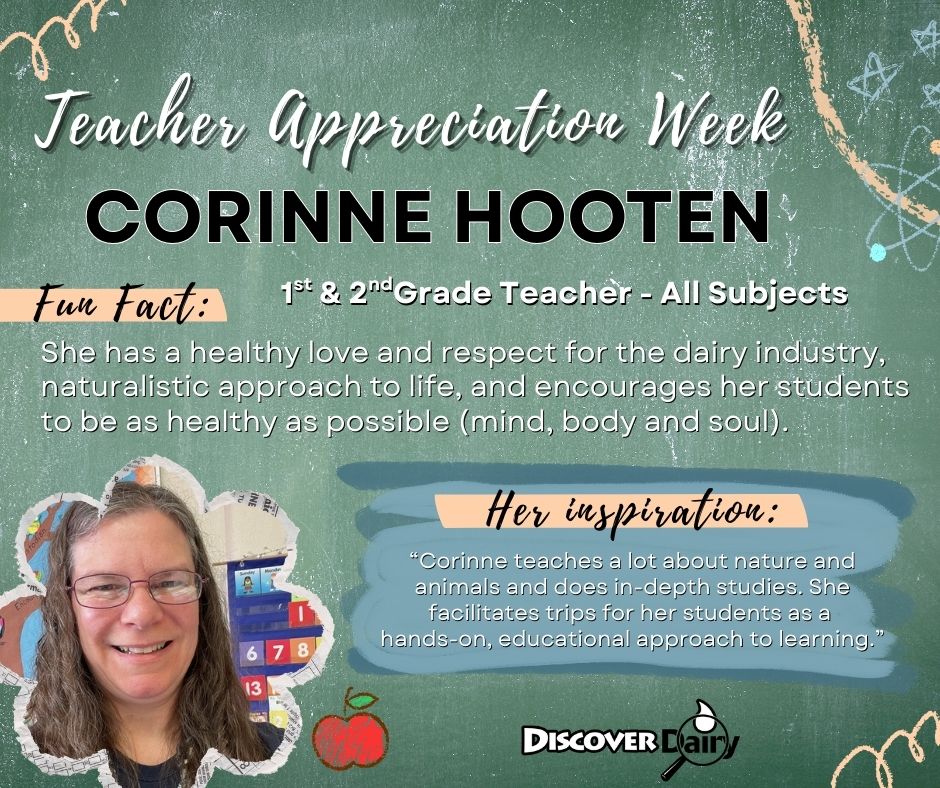
Corinne Hooten is a passionate and dedicated teacher at Bradford Area Christian Academy, where she shapes the minds and hearts of 1st and 2nd grade students. With a deep respect for the dairy industry and a naturalistic approach to life, Corinne encourages her students to embrace healthy habits for the mind, body, and soul.
Her hands-on teaching style makes learning come alive. Corinne takes her students on farm visits, teaches about ecosystems, habitats, and the natural world, and facilitates in-depth studies of animals and their environments. Her commitment to experiential learning inspires her students to explore the world around them and build a connection to nature.
Through her participation in the Discover Dairy and Adopt a Cow programs, Corinne introduces her students to the dairy industry every other year, helping them understand animal care and healthy living. Her students benefit not only from her curriculum but from her unwavering dedication to making learning meaningful and impactful.
“Corinne is an amazing teacher who truly pours her heart into her students, teaching them the importance of a healthy, balanced life and a deep respect for the world around them.”
Meet Callie Thigpen
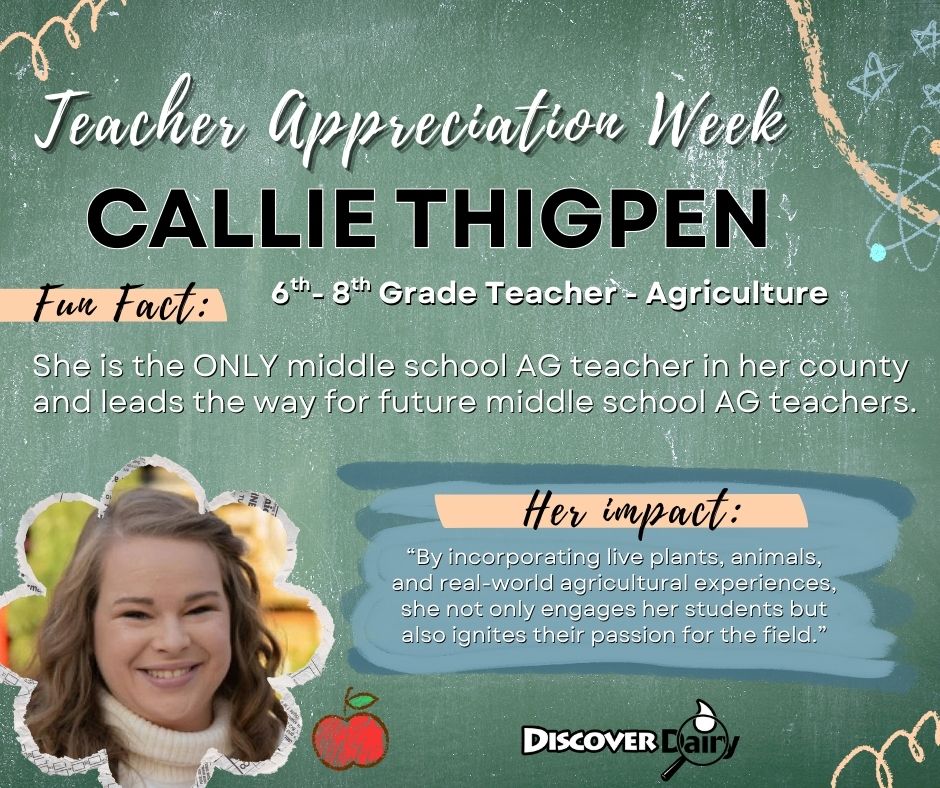
Callie Thigpen is lighting the way for agricultural education in middle school—and she’s doing it with heart, grit, and incredible impact. As the ONLY middle school agriculture teacher in her county, Callie teaches 6th and 7th grade students core topics like food production, plant and animal care, and soil systems, while helping 8th graders explore careers in agriculture, environmental science, and agribusiness.
Now in her third year of teaching—and her first as a mom—Callie continues to go above and beyond to create a classroom full of energy, discovery, and opportunity. From bringing in live plants and animals to leading students in tractor driving and beef judging competitions, she makes learning tangible and meaningful. Her dedication is inspiring students to consider future careers in ag and helping them build real-world skills they’ll carry for life.
“Callie’s hands-on approach ignites a passion for agriculture in her students. She’s not just teaching lessons—she’s shaping future leaders in the industry.”
Meet Wendy Hamilton
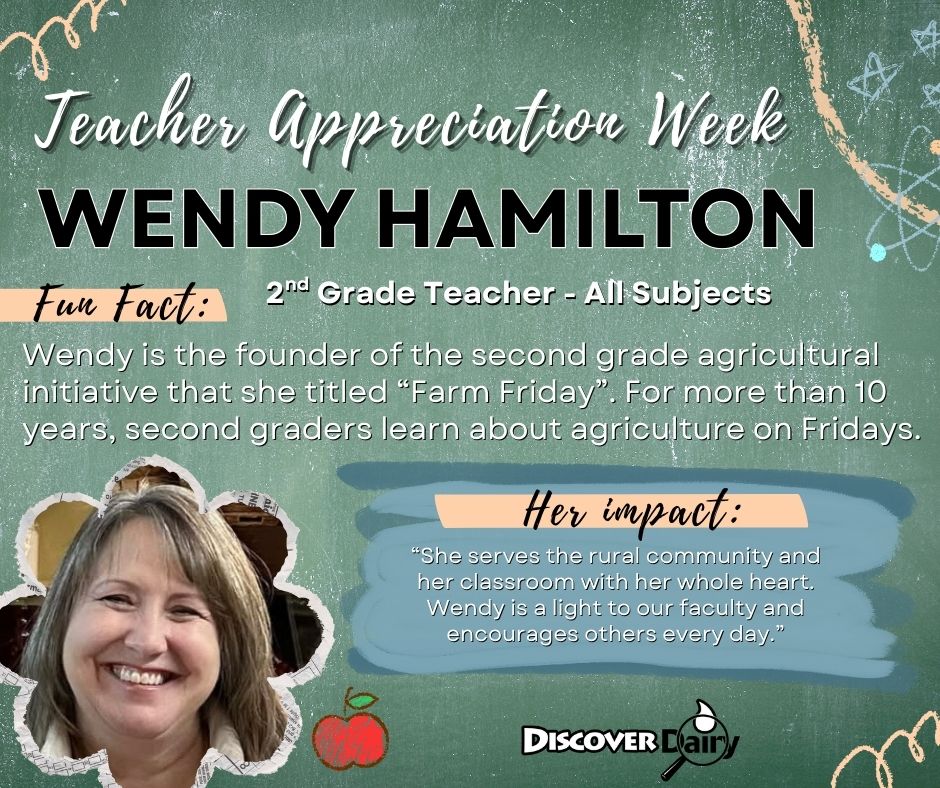
Wendy Hamilton, a 2nd grade teacher at Northern Potter Children’s School, brings her love for agriculture and education together in a way that transforms her classroom and community. With a dairy background and a deep passion for her rural roots, Wendy is the heart behind the school’s beloved Farm Friday program.
For over 10 years, Wendy has led Farm Friday with unwavering dedication—creating lessons, organizing virtual farm tours, inviting local farmers and FFA members into the classroom, and even teaching students about her own family’s maple farm. Each week, second graders explore how the food they eat and the products they use connect to agriculture, building real-world understanding and respect for the farming community.
Wendy’s impact doesn’t stop with her students. She lifts up the entire faculty with her encouragement, kindness, and enthusiasm. Her work reminds everyone that “No Farms, No Food” isn’t just a motto—it’s a mission that begins with education.
“Wendy is committed to making agriculture important because it is important to everyone. Her passion is what makes Farm Fridays so successful and meaningful for our students.”